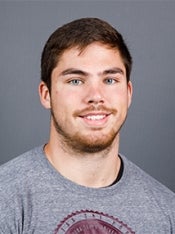Editor’s note: This story is part of a series of profiles of notable fall 2023 graduates.
Yannik Haller discovered a passion for molecular biology during an undergraduate immunology class.
“In this class, I learned about the molecular basis of life and how everything is intertwined on a molecular level,” said Haller, who is graduating with a PhD in molecular biology.
It was these experiences that led Haller to pursue a PhD in molecular biology from the School of Life Sciences and seek out pathogenic human disease research opportunities in the Biodesign Center for Bioelectronics and Biosensors.
Throughout his studies, Haller learned the importance of asking questions and getting support from others, particularly while conducting research with Shelley Haydel, a professor in the center and associate director of School of Life Sciences undergraduate programs.
“Being open to reach out and ask for help and support when you need it makes things much easier. Everyone has been nothing short of happy to help with whatever concern I've had,” he said. “Shelley Haydel taught me how to be creative in a scientific environment and how to be a successful scientist. I attribute my scientific success here at ASU to Dr. Haydel.”
After graduation, Haller is planning to start a career in the industrial research sector.
Q: What’s something you learned while at ASU — in the classroom or otherwise — that surprised you or changed your perspective?
A: It is certainly difficult to choose from the many valuable lessons I was taught here at ASU throughout my graduate studies. What has positively surprised me is the breadth of research that is conducted here at ASU and the openness to collaborations. Everyone is incredibly helpful and ready to collaborate on scientific studies. This is also reflected in my interdisciplinary studies and the collaborations the Haydel Lab has fostered over the years.
Q: Why did you choose ASU?
A: I chose ASU because of its state-of-the-art research facilities and the breadth of research that is conducted here. Moreover, Dr. Haydel stood out to me with her research and was a primary reason for my choosing ASU. Further, I've always been interested in the desert environment of Arizona and the wide array of hobbies and activities that can be cultivated and pursued here.
Q: What was your favorite spot on campus, whether for studying, meeting friends or just thinking about life?
A: Since I've spent a significant portion of my past five years there, I'd have to say the Biodesign Institute. I like the quiet yet exciting atmosphere of research, and it has helped me throughout my time.
Q: What are your plans after graduation?
A: After graduation, I’m not planning on taking a break from academia, but rather I will continue to work, even though I probably do deserve a little break. I am planning on joining the industrial research sector, and one of my outstanding dreams is to get an MBA at some point during this career.
Q: If someone gave you $40 million to solve one problem on our planet, what would you tackle?
A: The curse of science is to know how much it costs to do science. While $40 million may sound like a lot, it does not go very far in science. However, having gone through COVID-19 during my academic career, I think a sector that needs increased resources is the diagnostic and prevention sector, including vaccines, novel drugs, susceptibility testing, etc. It is only a question of time until another pathogen can cause the next pandemic, and we need to be better prepared for this.
More Science and technology

ASU-led space telescope is ready to fly
The Star Planet Activity Research CubeSat, or SPARCS, a small space telescope that will monitor the flares and sunspot activity…

ASU at the heart of the state's revitalized microelectronics industry
A stronger local economy, more reliable technology, and a future where our computers and devices do the impossible: that’s the…

Breakthrough copper alloy achieves unprecedented high-temperature performance
A team of researchers from Arizona State University, the U.S. Army Research Laboratory, Lehigh University and Louisiana State…


